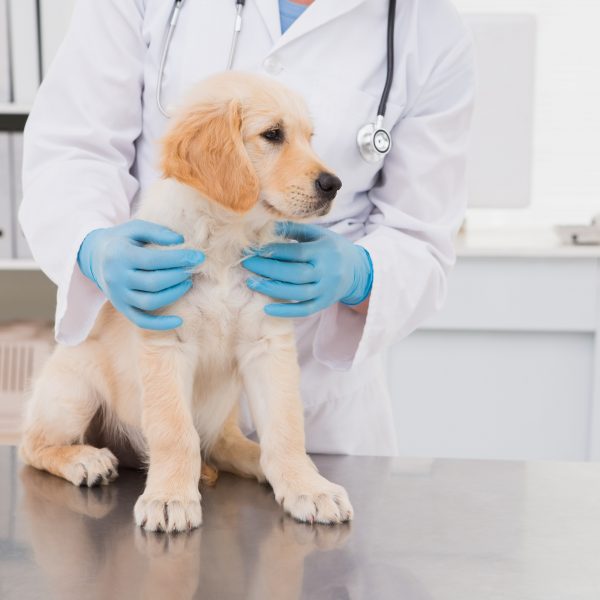7 Signs You Should Get Your Dog’s Thyroid Checked

Dogs can’t have a conversation with us when something is wrong. Instead, we have to keep an eye out for behavioral and physical changes that may indicate that something is going on with their health. Animals can have thyroid problems just as humans do and the symptoms can sometimes be subtle at first. Here are a few signs you should get your dog’s thyroid checked:
4 Signs of Hypothyroidism in Dogs
Hypothyroidism, which is an underperforming thyroid or low thyroid levels, is more common in dogs than hyperthyroidism. These are symptoms are hypothyroidism in dogs:
1. Lower Activity Level or Lethargy
Changes in behavior or activity level are often a sure sign that something is going on with your dog. The thyroid hormone helps regulate energy levels, so less activity, lethargy, and an intolerance for exercise can be a sign of hypothyroidism. It could also be an indication of something else, but you should take your dog to the vet regardless.
If your dog is feeling lethargic, they may not be as playful as usual. If you regularly take your dog on trips to the dog park, they may become less playful and active while they are there. You may also find that they are less interested in their favorite games and won’t walk as long as they normally would. On top of that, your dog may also start sleeping more than usual and exhibit a reluctance to get up and start moving around with you in the morning.
2. Weight Gain Not Caused by Overeating
It’s easy for dogs to gain weight when they’re fed too much, too often, or are given too many treats. However, if your dog is being fed a normal diet and still is gaining weight, it could be a sign that something is off with their thyroid.
Weight gain can happen when dogs are overfed, aren’t getting enough exercise, and sometimes as a side effect of getting older because they may not be moving around as much. If the weight gain in your dog doesn’t have an identifiable cause, it’s time for a trip to the vet to get their thyroid checked. Even if it ends up not being their thyroid, at least you’ll be able to rule out thyroid problems and make sure nothing else is affecting your pup’s health.
3. Problems with their Skin or Coat
Issues and problems with your dog’s skin or coat can be a sign that something isn’t right and could be a sign that there is something wrong with their thyroid. Hair loss, a dry coat, and dull hair can all be caused by hypothyroidism in dogs. These symptoms could show up as patches of thinning hair or you may start noticing that your dog’s skin flakes off more than usual during grooming.
4. Not Able to Handle the Cold
Some dogs can handle the cold and some can’t. If your dog can’t handle the cold as well as they used to, it could be a sign of hypothyroidism. This symptom may appear as more reluctance than usual to leave a warm bed, more burrowing under blankets than usual, or your dog suddenly sitting closer to a heat source than they normally would.
You may also notice your dog shivering more in the cold than normal or showing signs of being cold at higher temperatures that they used to enjoy. Your dog may also turn back to the house and come back inside sooner than usual on potty breaks or during walks when it’s cold out.
3 Signs of Hyperthyroidism in Dogs
Hyperthyroidism, which is an overperforming thyroid or high thyroid levels, is more common in cats. It can occur in dogs, but it is rare. Here are some symptoms of hyperthyroidism in dogs:
1. Weight Loss and Hyper-Excitability
A dog with high thyroid levels will often exhibit hyper-excitability. They’ll get overly excited about everything and have a lot of energy. There are plenty of high-energy dog breeds, but if your dog is suddenly way more energetic and excitable than normal, there could be something going on.
Weight loss not caused by a change in diet is another symptom of hyperthyroidism in dogs. Some of it can be related to increased energy levels; but, if your dog’s thyroid is overactive, their body is not processing nutrients the way it should anymore, which results in weight loss.
2. Increases in Appetite and Thirst
If your dog is eating more and drinking more than usual, it could be a sign that their thyroid is overperforming. This, paired with the weight loss, is a sure sign that something is going on with your dog. Increases in appetite and thirst will also increase how often your dog goes to the bathroom. Vomiting and diarrhea are common signs of illness in dogs and they are also signs of hyperthyroidism.
3. Enlarged Thyroid Gland and Heart Issues
Hyperthyroidism in dogs often causes the thyroid gland to swell or become enlarged. In addition to an enlarged thyroid gland, hyperthyroidism can also cause heart issues. Symptoms like congestive heart failure are very serious and can be fatal. Other symptoms include tachycardia, which is a fast heart rate, dyspnea, which is shortness of breath, and cardiomegaly, which is an enlarged heart.
Thyroid issues can also affect balance and movement and can lead to vestibular disease. Many of the symptoms of hypothyroidism and hyperthyroidism are also symptoms of other illnesses or health issues. Regardless of the cause, if you see any of these symptoms, it’s important to take your dog to the vet to find out what’s going on. It may be an issue with their thyroid and it may not, but you will be getting your dog the help and care they need either way.
